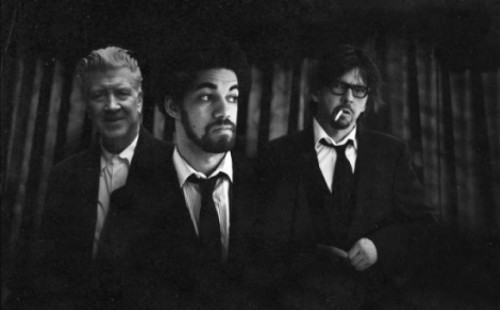If it weren’t for the tragic circumstances surrounding this release, it might have just flitted by as yet another Danger Mouse collaboration, like his formation of Gnarls Barkley with Cee-Lo Green, Danger Doom with MF Doom and Broken Bells with The Shins’ James Mercer. But the suicide earlier this year of Sparklehorse’s Mark Linkous gives the proceedings an added gravity.
Thankfully, this collection of songs—originally planned as an accompaniment to a David Lynch art photography book—is a fine final effort for Linkous, and another noteworthy addition to Danger Mouse’s reputation as a producer extraordinaire. Despite being performed by a who’s who of alt-rock all-stars like The Flaming Lips, Black Francis, The Strokes’ Julian Casablancas, Grandaddy’s Jason Lytle and Iggy Pop, the 13 songs are remarkably cohesive. The lush orchestral pop of “Just War” (sung by Super Furry Animals Gruff Rhys) is stunningly beautiful, Iggy’s electro-rock “Pain” blends fuzz guitar and harp strums for some great headphone fodder and The Shins’ Mercer pops up for the poppy “Insane Lullaby.” Linkous sings “Daddy’s Gone” himself, bringing some twang to the proceedings, and Lynch sings to surprisingly strong, and unsurprisingly creepy, effect on the scratchy, lo-fi “Dark Night of the Soul” and sprawling “Star Eyes.” If all all-star collaborations were as strong as Danger Mouse and Sparklehorse’s, we’d be begging for more. Instead, it’s a fine epitaph to Linkous’ music.
M.I.A., MAYA
From the moment she arrived on the music scene with her groundbreaking 2005 debut, Arular, M.I.A. has proven to be an artist who never met a sound or genre she couldn’t incorporate into something striking and new. Much of her work is grounded in her love of hip-hop and dance music, and samples of sirens, car horns and gunshots pop up in M.I.A.’s songs more than they have in anything since N.W.A. and Public Enemy were at the height of the rap game.
After a mainstream breakthrough with her sophomore album, Kala, thanks to the Clash-sampling “Paper Planes,” M.I.A. returns with a new collection that still relies on her maniacal appetite for blending seemingly incongruent sounds, but MAYA doesn’t work as a whole nearly as well as her first two full-lengths. She seems almost too willing to let the industrial noise take over; where once she created pastiches full of hooks, even if unusual ones, she now appears willing to steamroller her listeners with brute force. Also dragging down the proceedings is a lyrical focus on being “hard,” hip-hop style, with references to rolling into the club “tooled up like a thug” (“Steppin’ Up”), name-dropping her favorite drinks (“Teqkilla”) and “livin’ on the edge” (“It Is What It Iz”). There are strong moments to be sure, notably tracks like the reggae-tinged “It Takes a Muscle,” the roiling rock of “Born Free” and club hit-in-waiting “Tell Me Why.” There just aren’t as many as we’ve become accustomed to from M.I.A.
|
Dan
Nailen:
|
Speaking of Music Reviews, M.I.A., MAYA
-
Jason Isbell & The 400 Unit, Bronco
CD Reviews: Here We Rest, Painting Pictures of a Perfect Life
- Apr 19, 2011
-
SXSW 2011 Roundup
People tend to look at the South by Southwest Music Conference through the narrow tunnel of their own musical tastes ...
- Mar 22, 2011
-
Soundgarden, Wye Oak, Cory Mon & the Starlight Gospel
CD Reviews: Live on I-5, Civilian, Turncoats
- Mar 15, 2011
- More »
More by Dan Nailen
-
Too High to Die
Youthful indiscretion leads to a lifelong obsession with the Meat Puppets.
- Mar 22, 2017
-
Life-Changing Experience
Hendrix tribute brings Jimi's old bass player and amazing cast of guitarists to Utah.
- Mar 1, 2017
-
Him Again
Howard Jones is an '80s icon, Utah stalker and a one-man gateway to synth-pop's glories.
- Jul 6, 2016
- More »






